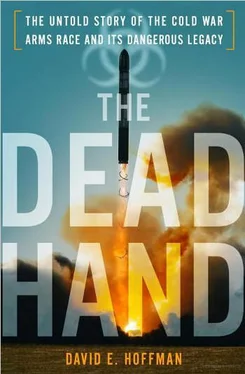Then Vessey, the chairman, gave a presentation about the problems of the land-sea-air triad caused by the congressional votes. But in the last part of his talk, Vessey suggested that it was time to take another look at strategic defenses. “We move the battle from our shores and skies,” said the briefing paper from which Vessey read. “Thus, we are kept from the dangerous extremes of (a) threatening a preemptive strike, or (b) passively absorbing a Soviet first strike—we have found the middle ground.” This was “more moral and therefore far more palatable to the America people…” Watkins then spoke and strongly supported Vessey.
McFarlane intervened to drive home the point: “Mr. President, this is very, very important.” He added, “For 37 years we have relied on offensive deterrence based on the threat of nuclear counter-attack with surviving forces because there has been no alternative. But now for the first time in history what we are hearing here is that there might be another way which would enable you to defeat an attack by defending against it and over time relying less on nuclear weapons.”
“Do you all feel that way?” Reagan asked. One by one, the president questioned the chiefs, and they responded affirmatively. The chiefs had not proposed a crash program to build missile defense; they had only proposed taking a harder look at it, given the political obstacles they had all confronted in Congress. But Watkins asked a rhetorical question that captured all Reagan had been thinking. “Would it not be better if we could develop a system that would protect, rather than avenge, our people?”
“Exactly,” Reagan said, seizing a slogan. “Don’t lose those words.”
That evening, in his diary, Reagan wrote of the meeting with enthusiasm. He said that out of the session had come “a super idea. So far the only policy worldwide on nuclear weapons is to have a deterrent. What if we tell the world we want to protect our people, not avenge them; that we’re going to embark on a program of research to come up with a defensive weapon that could make nuclear weapons obsolete? I would call upon the scientific community to volunteer in bringing such a thing about.” 60
The next day, Saturday, February 12, 1983, the capital was buried in one of the heaviest snowfalls of the century. The Reagans invited Shultz and his wife, O’Bie, to an informal dinner at the White House. Talkative and relaxed, Reagan offered Shultz a look at his “real feelings, his beliefs and desires,” Shultz recalled. Reagan told Shultz of his abhorrence of mutual assured destruction. The Friday meeting with the joint chiefs was still on his mind. “How much better it would be, safer, more humane, the president felt, if we could defend ourselves against nuclear weapons,” Shultz said. “Maybe there was a way, and if so, we should try to find it.” What Shultz didn’t grasp was that Reagan was going to do something about it—soon.
Reagan was also eager to test his own negotiating skills. Arms control talks with Moscow were deadlocked. In his diary, Reagan wrote, “Found I wish I could do the negotiating with the Soviets…” Shultz said Reagan “had never had a lengthy session with an important leader of a Communist country, and I could sense he would relish such an opportunity.” Shultz, seeking a thaw in negotiations, offered to bring Dobrynin to the White House for a meeting the following Tuesday. Despite objections from aides, Reagan agreed.
When Dobrynin showed up at the State Department for a routine scheduled appointment with Shultz at 5 P.M., the secretary said he had a surprise: a meeting with the president. They left from the State Department basement garage, so as not to be noticed, and arrived at the East Gate of the White House, not usually used for official visitors, then went to Reagan’s living quarters. They talked intensively over coffee for nearly two hours. “Sometimes we got pretty nose to nose,” Reagan wrote. 61They ranged over many topics, including Reagan’s insistence that the Soviets sought world conquest, and Dobrynin’s rebuttal that “we are not proclaiming a world crusade against capitalism.” Reagan pressed Dobrynin to grant permission to emigrate for a group of Pentecostals who had taken refuge in the American Embassy almost five years earlier. Reagan promised not to embarrass the Kremlin or “crow” if the request was met. Dobrynin passed it on. “For the Soviet leadership, Reagan’s request looked distinctly odd, even suspicious,” Dobrynin recalled. “After almost three years in office and at his first meeting with the Soviet ambassador, the president actually raised only one concrete issue—the Pentecostals—as if it were the most important issue between us.” But Jack F. Matlock Jr., who was then Soviet specialist on the National Security Council, reflected later that the Pentecostals were “a testing point in Reagan’s mind.”
“Ronald Reagan was intensely interested in the fate of individuals in trouble,” Matlock said. “He wanted to do everything in his power to help them. His harsh judgment of the Soviet leaders was based, more than any other single factor, not on the ideology he talked about so much, but on his perception of the way they treated their own people.” 62
In early 1983, at the lunch hour in London, a man often drove his car to an underground garage at a British intelligence safe house on Connaught Street, pulled a plastic cover over it to conceal the diplomatic license tags and went upstairs. The man was Oleg Gordievsky, and he was the KGB’s second-ranking official in the London office. He was also secretly an agent for the British and had been working with them for many years. Their relationship had begun in the 1970s, when Gordievsky was posted by the KGB to Denmark. Emotional, determined and realistic about the failures of the Soviet system, Gordievsky grew disillusioned with communism and fell in love with the West. “My feelings were immensely strong,” he recalled, “because I was living and working on the frontier between the totalitarian world and the West, seeing both sides, and constantly angered by the contrast between the two.
“The totalitarian world was blinded by prejudice, poisoned by hatred, riddled by lies. It was ugly, yet pretending to be beautiful; it was stupid, without vision, and yet claiming to be fit to lead the way and pioneer a path to the future for the rest of mankind. Anything I could do to damage this monster, I gladly would.”
When transferred back to Moscow from 1978 to 1982, he suspended his cooperation with the British, but resumed when he was posted to London in 1982. Gordievsky’s handler there was a man named Jack, and a woman, Joan. Originally they planned to meet once a month, but Gordievsky had so much to tell them, the frequency intensified to once a week. At first they spread out a big lunch for him, but later, with time so short, Gordievsky suggested just sandwiches and a can of beer. Gordievsky was known by a cover name, Felix. 63
Gordievsky said the British questioned him hard on political matters. He told them that by early 1983, the Soviet leaders were in a “a state of acute apprehension” about Reagan. The British generally didn’t show emotion in response to his comments, Gordievsky recalled. They sat still, writing in their notepads. They asked simple questions. But one day they were alarmed. Gordievsky had told them something stunning: the First Chief Directorate of the KGB in Moscow had sent instructions to the London station to watch for signs of preparation for nuclear war. This was RYAN—the global intelligence effort started by Andropov in 1981 to collect intelligence on a possible nuclear first strike—which was intensifying in early 1983.
The British “were all under the impression of the prevailing American theory about the balance of the nuclear powers, and the balance will guarantee the peace,” Gordievsky recalled. They were dumbfounded that “the Soviet machine, the Politburo, the Central Committee, the Ministry of Defense,” were worried about “a sudden nuclear attack outside the context of a conflict. It was against all American theories, and also British.”
Читать дальше












